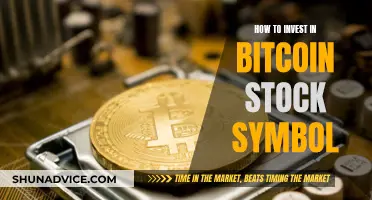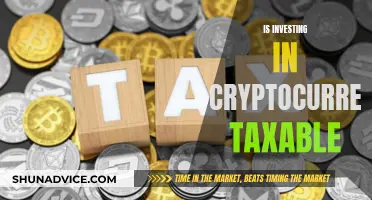
Bitcoin is a decentralised digital currency that was launched in 2009. It is a form of payment that does not require intermediaries like banks or governments. Bitcoin can be used as a currency or an investment. Bitcoin mining is the process of creating new Bitcoins and releasing them into circulation. Miners are rewarded with Bitcoins for validating transactions. The value of Bitcoin is highly volatile and has seen dramatic price swings. Bitcoin is stored in digital wallets, which can be hot (online) or cold (offline).
What You'll Learn

Bitcoin wallets: hot wallets vs cold wallets
When it comes to storing your Bitcoin or other cryptocurrencies, you'll need to choose between a "hot" wallet and a "cold" wallet, or a combination of the two.
A hot wallet is always connected to the internet, or another connected device, and is used to temporarily store and send/receive cryptocurrency. They are typically free and easy to use, but they are more vulnerable to online attacks and hacking. Examples of hot wallets include MetaMask, Coinbase Wallet, and Edge Wallet.
On the other hand, a cold wallet is typically not connected to the internet and is considered a more secure option. Cold wallets can be in the form of software apps or hardware devices. However, they tend to be more expensive and less convenient for trading. Examples of cold wallet devices include Trezor and Ledger.
If you're storing a significant amount of Bitcoin, a cold wallet is generally recommended as it provides greater security. However, if you're looking for convenience and ease of trading, a hot wallet might be more suitable. It's also worth considering using a combination of both types of wallets to strike a balance between accessibility and security.
Calculating Bitcoin ROI: A Step-by-Step Guide
You may want to see also

How to buy Bitcoin
There are several ways to buy Bitcoin, each with its own advantages and disadvantages. Here is a step-by-step guide on how to get started:
Step 1: Choose a Bitcoin Exchange or Brokerage
Firstly, you will need to decide whether to use a cryptocurrency exchange or a traditional stockbroker. Exchanges such as Gemini, Kraken, Coinbase, Crypto.com, and Binance.US offer a wide range of cryptocurrencies and generally carry a variety of fees and consumer protections. Traditional brokers that offer Bitcoin include Robinhood, Webull, TradeStation, and Fidelity.
Step 2: Fund Your Account
Before you can start investing in Bitcoin, you will need to fund your account. You can do this by linking your bank account, or by using a credit or debit card. It is important to note that purchasing Bitcoin with a credit card is not advisable, as it can incur high-interest debt if the value of Bitcoin decreases.
Step 3: Place Your First Order
Once your account is funded, you can place your first order. Depending on the platform, you may be able to purchase Bitcoin by tapping a button, or you may need to enter Bitcoin's ticker symbol: BTC. Next, input the amount you want to invest. If the current price of Bitcoin is $40,000, you would need to invest that much to buy 1 BTC. If you invested less, you would receive a percentage of a Bitcoin.
Step 4: Store Your Bitcoin
After purchasing Bitcoin, you will need to store it in a digital wallet. There are two main types of wallets: hot wallets and cold wallets. Hot wallets are connected to the internet and can be accessed through a computer browser or smartphone app. Examples of hot wallets include the Bitcoin.com Wallet app, Coinbase, and eToro. Cold wallets, on the other hand, are encrypted portable devices, similar to thumb drives, that allow you to download and carry your Bitcoins. Examples of cold wallets include Trezor and Ledger.
Step 5: Consider the Risks
It is important to remember that buying Bitcoin carries several risks. Bitcoin is a highly volatile asset, and its value can fluctuate significantly. There are also security and fraud risks associated with digital currencies, as exchanges are vulnerable to hackers and malware. Additionally, Bitcoin and other cryptocurrencies are not insured by the Securities Investor Protection Corporation or the Federal Deposit Insurance Corporation. Therefore, it is crucial to carefully consider your financial situation and risk tolerance before investing in Bitcoin.
The Pros and Cons of Investing in Bitcoin
You may want to see also

Bitcoin's value
The value of Bitcoin is also determined by its limited supply. It has a fixed supply of 21 million, and no more Bitcoin can be created. Bitcoin's supply is controlled by its halving process, which involves automatically halving the number of new Bitcoins entering circulation every 210,000 blocks, or roughly every four years. This process will continue until around 2140, when there will be no more new Bitcoins created.
The process of mining Bitcoin also affects its value. Bitcoin miners are rewarded with Bitcoin for their efforts in validating transactions and adding blocks to the blockchain. The competitive incentive to mine will disappear once the halving process is complete, as only transaction fees will remain as a reason to participate in Bitcoin's network.
Overall, Bitcoin's value is determined by a combination of its performance as a currency, its investment potential, its limited supply, and the process of mining.
Smartly Diversifying Your Crypto Portfolio: How Many Coins?
You may want to see also

Bitcoin mining
Miners who participate in this process compete for rewards in the form of Bitcoin. The current Bitcoin mining reward is 3.125 BTC per block, and it shrinks by half roughly every four years.
The process of Bitcoin mining involves solving complex algorithms, which is all part of Bitcoin’s proof of work consensus mechanism, which aims to add a new block every 10 minutes. The more computing power a miner has, the more likely it is to win blocks.
ASICs consume huge amounts of electricity, which has drawn criticism from environmental groups and limits the profitability of miners. The electricity for one ASIC can use the same amount of electricity as half a million PlayStation 3 devices, according to a 2019 report from the Congressional Research Service.
The process of Bitcoin mining is as follows:
- When a transaction is made between wallets, the addresses and amount are entered into a block on the blockchain.
- The block is assigned some information, and all of the data in the block is put through a cryptographic algorithm (called hashing).
- The result of hashing is a 64-digit hexadecimal number, or hash.
- Miners are guessing a number that is lower than the target hash. The target hash is a hexadecimal number set to require an average number of attempts.
- Miners make these guesses by adjusting the nonce, which is part of the information being hashed.
- When information is hashed, it always produces the same output unless something changes. So, the mining program sends block information with a zero as the first nonce through the hashing function. If that number is wrong, the nonce is increased by a value of one, and the hash is generated again. This continues until a hash that is less than the target hash is generated.
- The first miner to find the solution to the problem receives bitcoins as a reward, and the process begins again.
The Ultimate Guide to Investing Bitcoin with Fidelity
You may want to see also

Bitcoin's future
Bitcoin is a relatively new asset class, and its future is uncertain. However, there are several factors that could influence its trajectory.
Firstly, Bitcoin is a decentralized form of digital cash that eliminates the need for intermediaries like banks and governments. This feature has made it attractive to those seeking an alternative, decentralized currency outside the control of regular financial institutions and authorities. The degree of acceptance and adoption of Bitcoin is crucial to its future success. While it has been gaining traction, with a growing number of businesses and individuals using it, it still needs to expand further to benefit from network effects and stabilize its price.
Secondly, Bitcoin's price is highly volatile due to its small market size and the impact of relatively small events, trades, or business activities. This volatility may decrease as the Bitcoin market matures and becomes less speculative. The Bitcoin halving events, which occur approximately every four years, also influence its price. These events reduce the reward for mining Bitcoin by half, thereby decreasing its supply and potentially driving up its price.
Thirdly, the regulatory landscape surrounding Bitcoin and cryptocurrencies is evolving. While some jurisdictions have imposed restrictions or bans on foreign currencies or cryptocurrency exchanges, others are developing rules to integrate this new technology into the formal financial system. The approach that governments and regulators take towards Bitcoin will significantly impact its future.
Lastly, Bitcoin's technological foundation, the blockchain, provides a secure and transparent way to record transactions. This technology has been continuously maturing and optimizing, and advancements in this area could enhance Bitcoin's efficiency, security, and scalability.
In conclusion, Bitcoin's future is highly speculative, and it could either emerge as a mainstream global currency or suffer significant setbacks due to regulatory, economic, or technological factors. Its success will depend on achieving wider adoption, navigating the regulatory landscape, and maintaining the integrity and advancement of its underlying technology.
A Beginner's Guide to Investing in Bitcoin (in Australia)
You may want to see also
Frequently asked questions
You can buy and hold Bitcoin as an investment. You can use a cryptocurrency exchange to buy, sell and hold Bitcoin. Setting up an account is similar to opening a brokerage account—you’ll need to verify your identity and provide funding.
There are many risks involved with investing in and using bitcoins, including volatility, fraud, and theft. Bitcoin is also not insured by the Securities Investor Protection Corporation (SIPC) or the Federal Deposit Insurance Corporation (FDIC).
Bitcoin has a lot of liquidity in the market and many investors use it as a hedge for inflation. There are also new Bitcoin investing instruments that offer a bit more protection.
You can store your Bitcoin in a hot wallet or a cold wallet. A hot wallet is connected to the internet, while a cold wallet is not.







